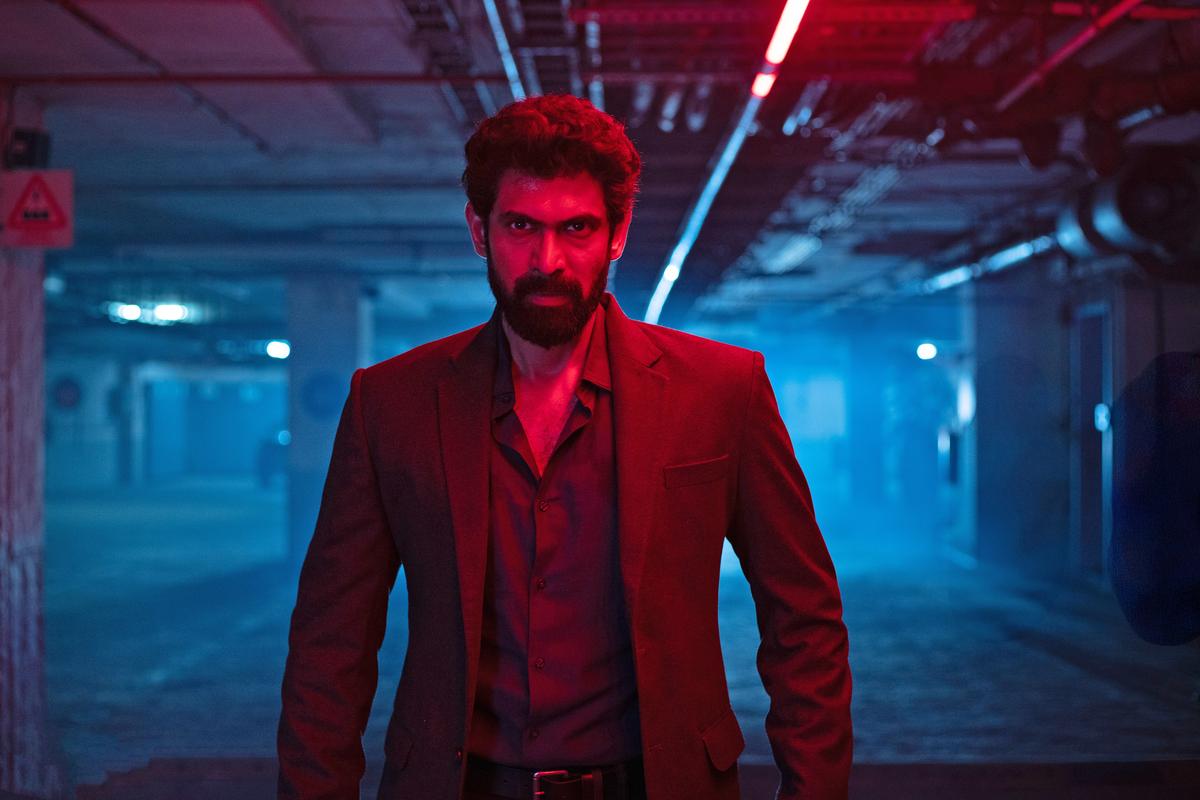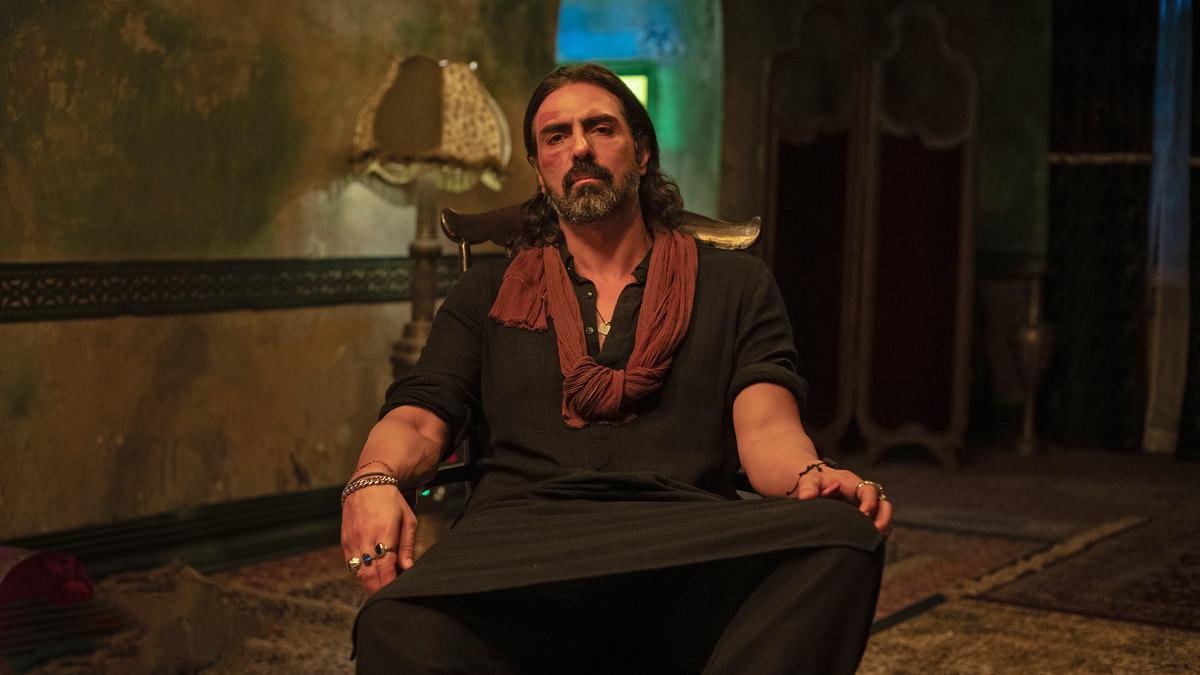When things take a dark turn in Rana Naidu season two, Rana (Rana Daggubati) tries to reassure his daughter Nitya (Afrah Sayed) that everything will be fine. She retorts that nothing will ever be the same. This exchange encapsulates the story’s core, which follows the consequences of Rana’s actions as a fixer in Mumbai, tasked with managing the scandals of celebrities. Written by Karan Anshuman and Ryan Soares, with dialogues by Vaibhav Vishal, the series is directed by Suparn S Varma, Karan Anshuman and Abhay Chopra. It traces Rana’s attempts to protect his family while continuing his long-standing conflict with his father, Naga Naidu (Venkatesh Daggubati).
Loosely adapted from the American series Ray Donovan, the first season drew criticism for making Venkatesh, a long-time favourite in Telugu family films, deliver frequent expletives for shock effect. The new season offers a more restrained portrayal. Venkatesh avoids most of the profanity, though others around him do not. Unlike the first season, which opened provocatively, this one begins with Venkatesh practising pranayama — the calm before the storm.

Rana Naidu 2 is more personal. It no longer centres on Rana fixing problems for celebrities, but on whether he can resolve the turmoil threatening his own family. His relationship with his wife Naina (Surveen Chawla) is more strained than ever, while his son Ani (Madhav Dhingra) and daughter Nitya face their own uncertainties. The ambitions and entanglements of Rana’s brothers — Tej (Sushant Singh) and Jaffa (Abhishek Banerjee) — further complicate matters. Meanwhile, Rana’s shifting dynamics with his boss OB Mahajan (Rajesh Jais) and the Oberoi family (led by Rajat Kapoor) add to the tension.
Rana Naidu 2 (Hindi, English)
Directors: Suparn S Varma, Karan Anshuman and Abhay Chopra
Cast: Venkatesh Daggubati, Rana Daggubati, Arjun Rampal, Surveen Chawla, Kriti Kharbanda
Episodes: Eight, 35 to 55 minutes
Streaming on: Netflix
The face-offs between Venkatesh and Rana that enlivened the first season take a backseat here, except in the opening episode. One of them becomes a reluctant collaborator, joining forces only for a specific mission. In this episode, the real-life uncle-nephew dynamic plays out well, despite lines such as Venky introducing Rana as ‘muscle ka dukaan’ and the ‘beast of Hyderabad’.

Rana Daggubati in the series
| Photo Credit:
Aditya Verma/Netflix
The narrative remains centred on Rana’s attempts to protect his family, rather than Naga’s antics. A final high-stakes job triggers further chaos.
Rana Naidu 2 also explores other dysfunctional families, along with a few relationships that offer some hope. A business tycoon clings to his empire, while his daughter pursues her own agenda. Her brother and husband are not passive observers. Kriti Kharbanda is a notable addition, portraying a morally ambiguous character with ease.
The story introduces Rauf Mirza (Arjun Rampal), an underworld don initially operating from prison. Here too, family dynamics intersect with vote-bank politics and power struggles. Greed and power fuel shifting alliances and broken ties, as the story attempts to expose the futility of both. Across eight episodes ranging from 35 to 55 minutes, Rana Naidu 2 grows darker, with heightened action, though the transitions are not always seamless.

Arjun Rampal as Rauf Mirza
| Photo Credit:
Aditya Verma/Netflix
A don’s hold over a vote bank is initially outlined with precision, only to be sidelined and later revived for a convenient, subdued conclusion. The focus leans more towards personal relationships, loss and revenge than on the crime-politics nexus. Arjun Rampal brings manic energy to his role, maintaining menace even as the character weakens under familiar tropes.

The constants amid the turmoil are Rana’s trusted aides, played by Adithya Menon and Lauren Robinson, though their impact is less sharp than in the previous season. A subplot involving a rapper’s ambition and bond with his mentor briefly surfaces, feeding into the larger themes of destruction and revenge.
The weakest link remains the portrayal of romantic relationships. The subplot involving Jaffa’s relationship is particularly problematic. What might ordinarily be dismissed or condemned as perverse is later developed into a sensitive story. The question remains whether this arc could have been introduced more thoughtfully. Abhishek Banerjee’s performance, however, stands out.
The performances anchor the series. Venkatesh may use fewer Hyderabadi Dakhni phrases this time — aside from the recurring baigan ke bataan — but lends his character depth, expressing a quiet yearning for reconciliation with his son. A brief scene also shows him performing the ‘Venky asana’, an Easter egg for Telugu audiences. Rana maintains a brooding intensity, using his gaze to convey threats to his loved ones. His character, however, risks becoming one-dimensional, with his presence utilised best in action sequences opposite Arjun Rampal.
The adult couples in the story often act with the impulsiveness of teenagers as the prospect of a safe, happy family grows increasingly distant. The subplot involving Dino Morea merely highlights another impulsive relationship.
As the story narrows into chases, betrayals, revenge and action sequences, the psychological tension diminishes. The action is staged in the style of mainstream cinema, shot skilfully by John Schmidt, with John Stewart Eduri’s score enhancing the mood.
There is scope for a third season, but it will require sharper writing.
Published – June 13, 2025 02:48 pm IST



